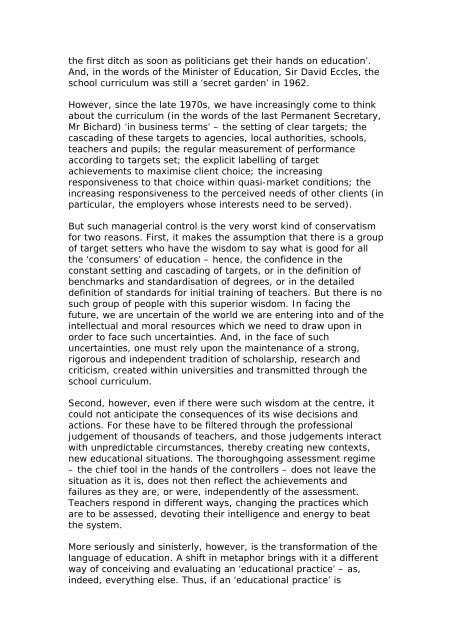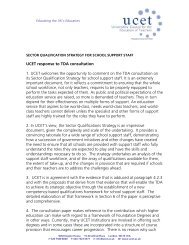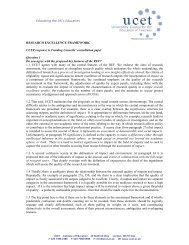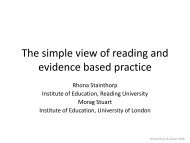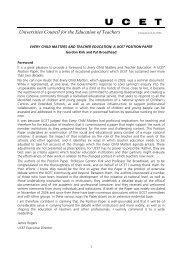The School Curriculum Ten Years Hence - UCET: Universities ...
The School Curriculum Ten Years Hence - UCET: Universities ...
The School Curriculum Ten Years Hence - UCET: Universities ...
You also want an ePaper? Increase the reach of your titles
YUMPU automatically turns print PDFs into web optimized ePapers that Google loves.
the first ditch as soon as politicians get their hands on education’.<br />
And, in the words of the Minister of Education, Sir David Eccles, the<br />
school curriculum was still a ‘secret garden’ in 1962.<br />
However, since the late 1970s, we have increasingly come to think<br />
about the curriculum (in the words of the last Permanent Secretary,<br />
Mr Bichard) ‘in business terms’ – the setting of clear targets; the<br />
cascading of these targets to agencies, local authorities, schools,<br />
teachers and pupils; the regular measurement of performance<br />
according to targets set; the explicit labelling of target<br />
achievements to maximise client choice; the increasing<br />
responsiveness to that choice within quasi-market conditions; the<br />
increasing responsiveness to the perceived needs of other clients (in<br />
particular, the employers whose interests need to be served).<br />
But such managerial control is the very worst kind of conservatism<br />
for two reasons. First, it makes the assumption that there is a group<br />
of target setters who have the wisdom to say what is good for all<br />
the ‘consumers’ of education – hence, the confidence in the<br />
constant setting and cascading of targets, or in the definition of<br />
benchmarks and standardisation of degrees, or in the detailed<br />
definition of standards for initial training of teachers. But there is no<br />
such group of people with this superior wisdom. In facing the<br />
future, we are uncertain of the world we are entering into and of the<br />
intellectual and moral resources which we need to draw upon in<br />
order to face such uncertainties. And, in the face of such<br />
uncertainties, one must rely upon the maintenance of a strong,<br />
rigorous and independent tradition of scholarship, research and<br />
criticism, created within universities and transmitted through the<br />
school curriculum.<br />
Second, however, even if there were such wisdom at the centre, it<br />
could not anticipate the consequences of its wise decisions and<br />
actions. For these have to be filtered through the professional<br />
judgement of thousands of teachers, and those judgements interact<br />
with unpredictable circumstances, thereby creating new contexts,<br />
new educational situations. <strong>The</strong> thoroughgoing assessment regime<br />
– the chief tool in the hands of the controllers – does not leave the<br />
situation as it is, does not then reflect the achievements and<br />
failures as they are, or were, independently of the assessment.<br />
Teachers respond in different ways, changing the practices which<br />
are to be assessed, devoting their intelligence and energy to beat<br />
the system.<br />
More seriously and sinisterly, however, is the transformation of the<br />
language of education. A shift in metaphor brings with it a different<br />
way of conceiving and evaluating an ‘educational practice’ – as,<br />
indeed, everything else. Thus, if an ‘educational practice’ is


